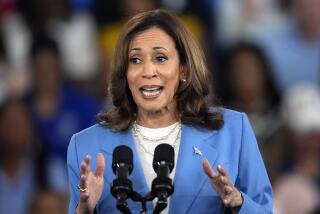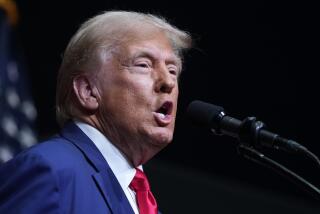Tsongas Refuses to Vary His Economic Message : Campaign: Candidate rejects advice to refocus his platform in order to talk about issues that are more appealing to working-class Democrats.
COLUMBIA, S.C. — According to convention, when a Democratic presidential candidate stands in a factory doorway with a group of hard hats, the politician is supposed to talk about job security, fair wages and government programs for the working person.
But when former Massachusetts Sen. Paul E. Tsongas came to the Chatham Steel plant here earlier this week, he talked of capital gains taxes and the cost of capital. “Here is a company that could have gone under, and rather, made the investment,” he said. “And now people are working.”
Faced with a round of tough primaries next Tuesday in the Southern stronghold of Arkansas Gov. Bill Clinton, Tsongas has been getting advice to adjust his platform to give it more appeal to working-class Democrats he so far has failed to attract.
But he has rejected that counsel. Instead, he has decided to find some different audiences, switch stage props and fine-tune his message--not change it--to better convey how his economic revival plan would benefit average wage earners.
“We’re broadening the message,” Tsongas said. “It’s all in the language.”
At Chatham Steel, the message to factory workers was that good jobs come from strong employers--and that government, through tax breaks for businesses and investors--must help make them that way. At a Wednesday night rally in San Antonio, before the facade of the Alamo, he argued that a free-trade agreement with Mexico--strongly opposed by organized labor--is needed to invigorate the North American economy and help average Americans.
Political professionals say the approach probably is the best route he can take, but a tricky one at best.
His strongest support has come from upscale, better-educated suburbanites. Now, however, he must reach out to other segments of the electorate to hold his own in the South and position himself for victories in the Illinois and Michigan primaries on March 17. Given the details of the economic recovery plan that is at the core of his candidacy, it will not be an easy task.
To revive the economy, Tsongas has proposed a targeted capital gains tax cut, investment tax credits and a federal budget freeze. He advocates relaxation of some antitrust rules to enable U.S. companies to better compete against foreign businesses. And he opposes a middle-class tax cut because, he argues, it would increase the deficit while doing virtually nothing to stimulate the economy.
It is an economic message which makes Tsongas vulnerable to attacks by Clinton that his program is no more than a modified version of the “trickle down economics” of the Bush and Ronald Reagan administrations. Clinton has sought to pound home that message this week; his TV ads in Florida quote Tsongas’ 1991 comment that as President, he would be “the best friend Wall Street ever had.”
But analysts say it would be a mistake for Tsongas to try to sweeten his message with new “lollipop” policies designed to win the hearts of average Americans, because doing so would undermine his appeal as a truth-telling, unconventional candidate. What he needs to do, the analysts say, is present his program in more palatable terms.
Says Greg Schneiders, a Washington-based Democratic political consultant: “So far, he’s told people about the pain that’s needed to get them to the promised land, but he hasn’t told them much about how great it will be for average Americans once they get there. You can only get people to wear the hair shirt for so long before they want to trade it in for something in cashmere.”
Schneiders said that convincing people of the need for sacrifice, while encouraging them with the promise of a pay-off, takes rare rhetorical and political skills. “I’m not sure Paul Tsongas is up to it,” he said.
Tsongas said he must not vary from his economic message, bitter though it sounds, because it is the message that gives him his greatest leverage with the independent and moderate voters who can enable him to beat George Bush.
With the message, “I can survive now, and maximize my reach with independents and Republicans in November,” Tsongas said. “None of this is important if you don’t beat George Bush.”
Clinton continued to hammer at Tsongas’ economic proposals Thursday, saying they were aimed at helping the few rather than the many. But Tsongas made no apology for his refusal to advocate a middle-class tax cut.
“My responsibility is to have a tax policy that drives the economic engine of this country,” he said during a campaign stop in Texas. “Once we’ve done that and we’re competing with Japan and Germany, then you go back and deal with tax fairness.”
In recognition of his vulnerabilities in the Southern contests that dominate next Tuesday’s 11 primaries and caucuses, Tsongas has been steadily downplaying expectations. “Super Tuesday was set up to blow away Northern candidates,” he said.
But he is widely expected to win two of the day’s primaries--in his home state of Massachusetts and in neighboring Rhode Island. And in several Southern states, he is hoping to match the 24% of the vote he got in running second to Clinton in the Georgia primary last Tuesday.
Calling this a “silver medal strategy,” Tsongas said a string of second-place showings would put him in satisfactory position for the Michigan and Illinois primaries, which many analysts say will be key tests of the candidates’ fundamental appeal.
Over the next few days, Tsongas plans multiple visits to Florida and Texas--home to large populations of upper-middle-class suburbanites--as well as to Tennessee, Rhode Island and Massachusetts.
Tsongas acknowledges that leading up to last Tuesday’s contests, he was damaged by attacks on his qualified pro-nuclear stand. In Florida, he has already moved to preempt questions about his environmental record by publicizing his strong support for the preservation of the Everglades.
Tsongas also said he hopes to win a large share of the voters who planned to back Nebraska Sen. Bob Kerrey, who dropped out of the presidential race Thursday. He said he would appeal to these voters by touting his proposal for national health insurance--the centerpiece of Kerrey’s campaign.
Also, he speculated that his successful struggle with cancer might attract support from those who were drawn to Kerrey because of his loss of a leg in Vietnam.
Meanwhile, in an effort to deal with the demands of running in several states at once, the Tsongas campaign has been adding paid staff members this week. It also has reported receiving $1.4 million in contributions last month--compared to $1.1 million during all of last year.
More to Read
Get the L.A. Times Politics newsletter
Deeply reported insights into legislation, politics and policy from Sacramento, Washington and beyond. In your inbox three times per week.
You may occasionally receive promotional content from the Los Angeles Times.











